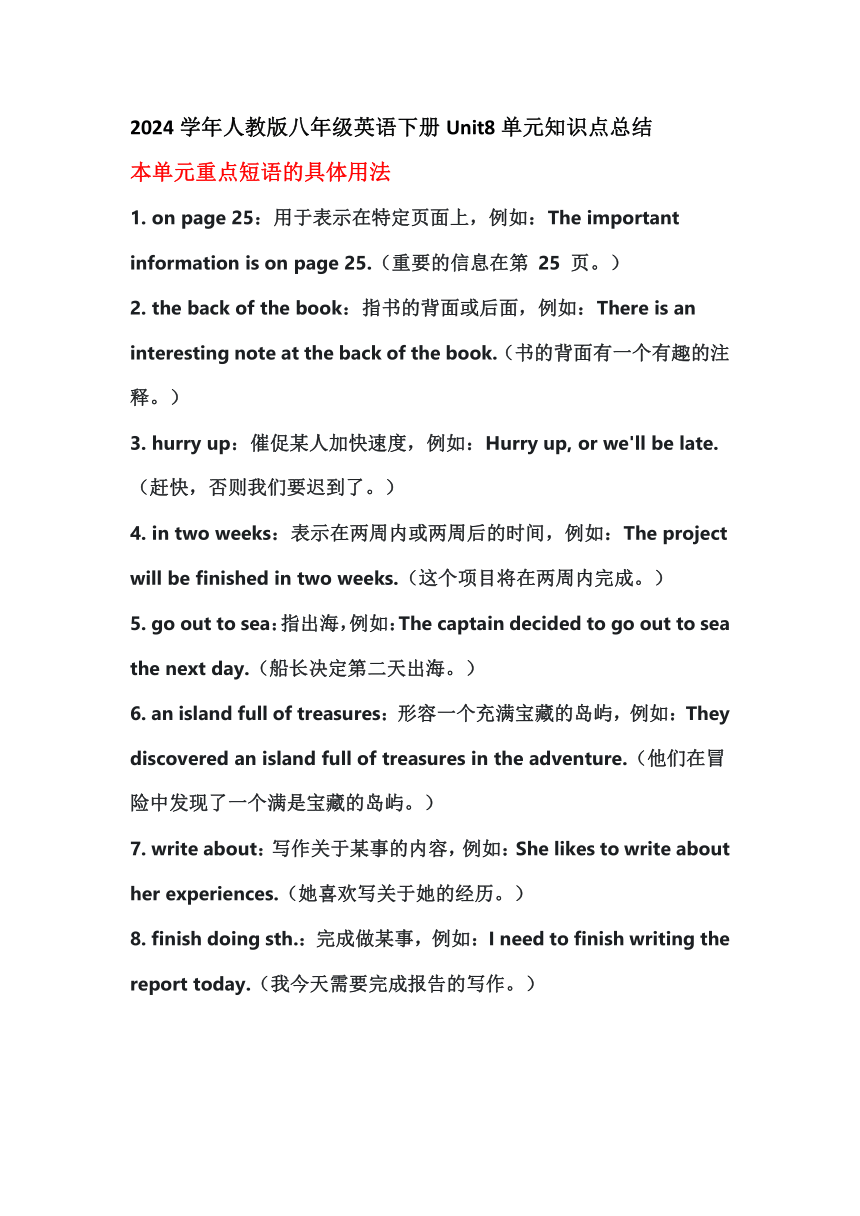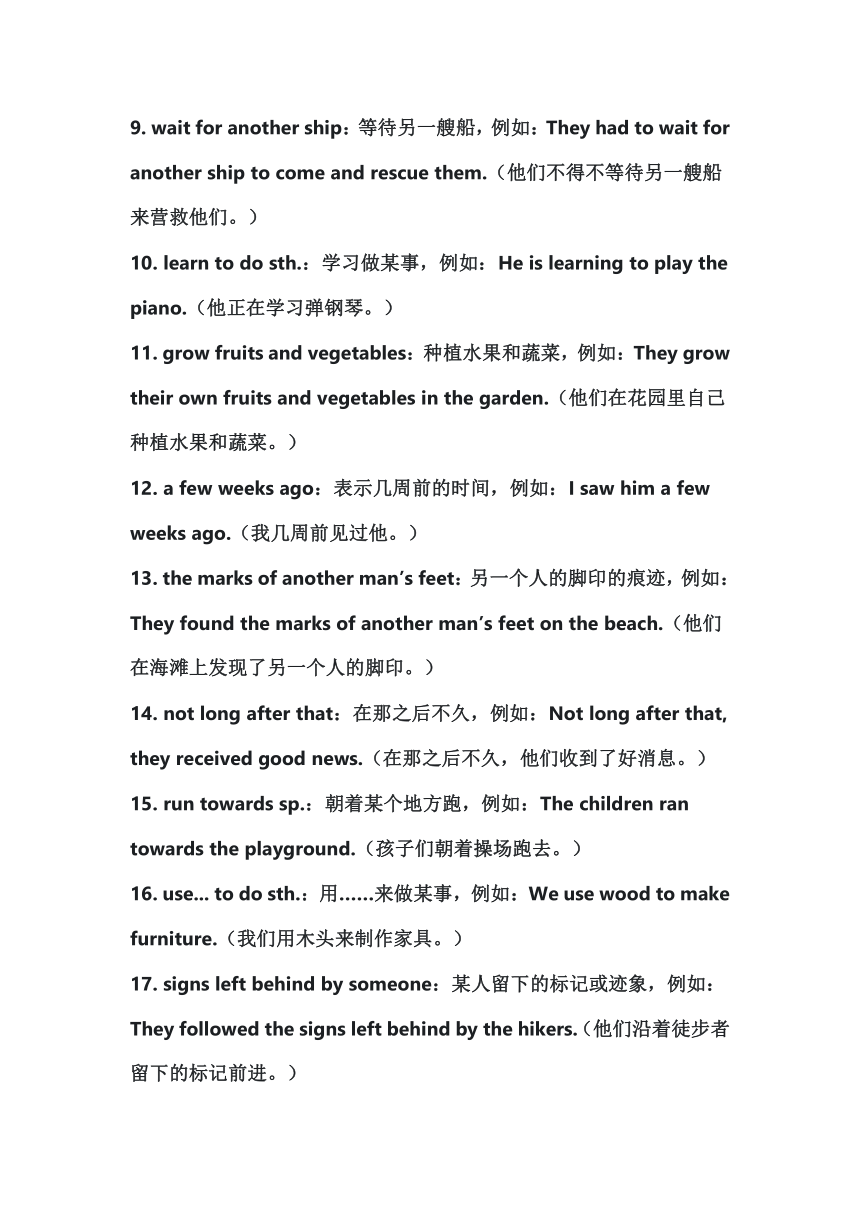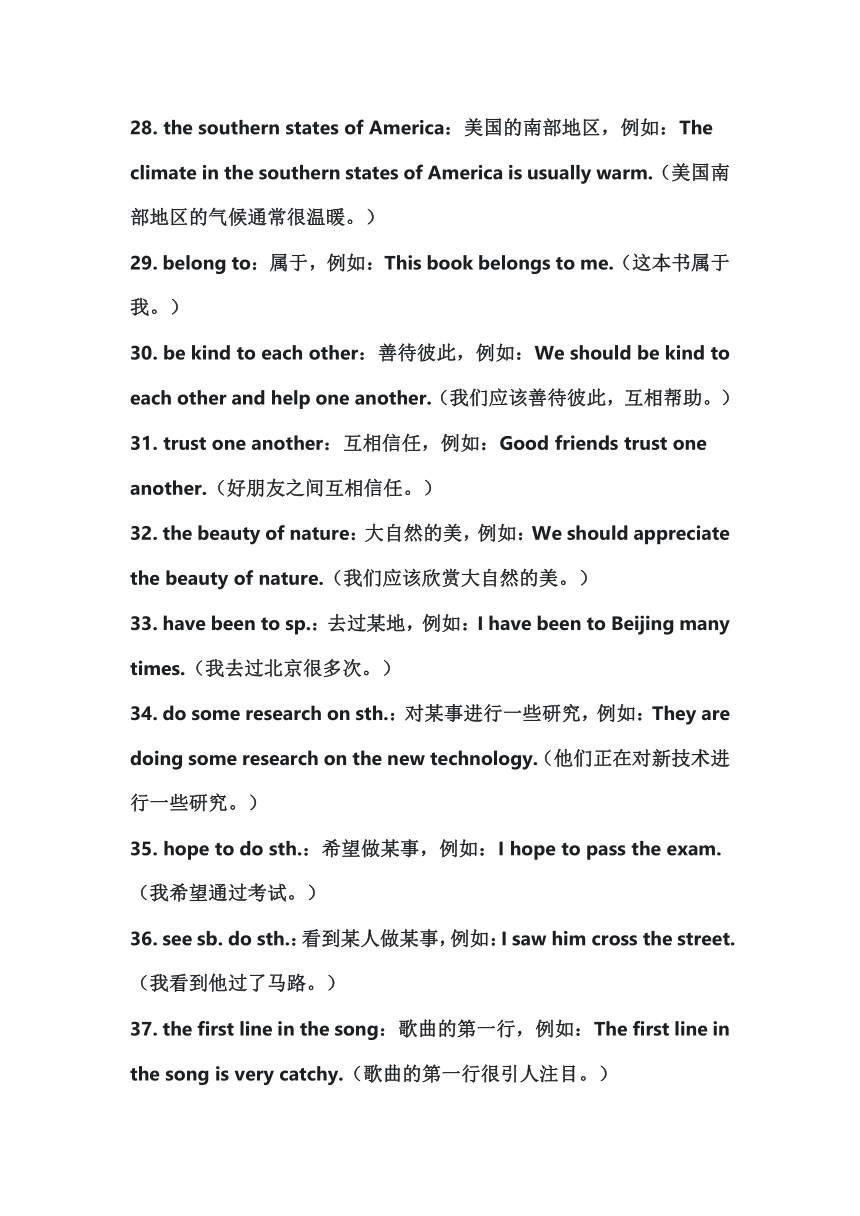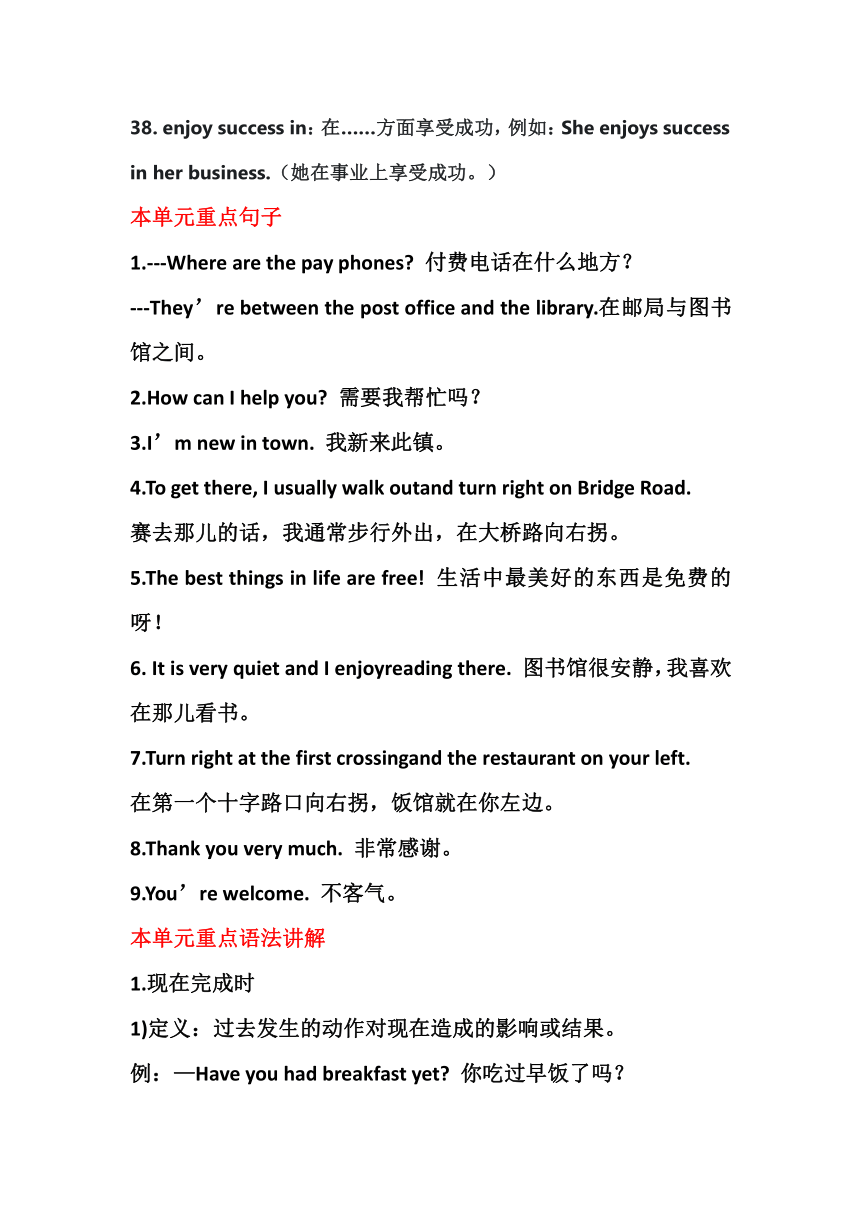Unit 8 Have you read Treasure Island yet?单元知识点总结
文档属性
| 名称 | Unit 8 Have you read Treasure Island yet?单元知识点总结 |  | |
| 格式 | docx | ||
| 文件大小 | 21.2KB | ||
| 资源类型 | 教案 | ||
| 版本资源 | 人教新目标(Go for it)版 | ||
| 科目 | 英语 | ||
| 更新时间 | 2024-02-25 11:05:39 | ||
图片预览





文档简介
2024学年人教版八年级英语下册Unit8单元知识点总结
本单元重点短语的具体用法
1. on page 25:用于表示在特定页面上,例如:The important information is on page 25.(重要的信息在第 25 页。)
2. the back of the book:指书的背面或后面,例如:There is an interesting note at the back of the book.(书的背面有一个有趣的注释。)
3. hurry up:催促某人加快速度,例如:Hurry up, or we'll be late.(赶快,否则我们要迟到了。)
4. in two weeks:表示在两周内或两周后的时间,例如:The project will be finished in two weeks.(这个项目将在两周内完成。)
5. go out to sea:指出海,例如:The captain decided to go out to sea the next day.(船长决定第二天出海。)
6. an island full of treasures:形容一个充满宝藏的岛屿,例如:They discovered an island full of treasures in the adventure.(他们在冒险中发现了一个满是宝藏的岛屿。)
7. write about:写作关于某事的内容,例如:She likes to write about her experiences.(她喜欢写关于她的经历。)
8. finish doing sth.:完成做某事,例如:I need to finish writing the report today.(我今天需要完成报告的写作。)
9. wait for another ship:等待另一艘船,例如:They had to wait for another ship to come and rescue them.(他们不得不等待另一艘船来营救他们。)
10. learn to do sth.:学习做某事,例如:He is learning to play the piano.(他正在学习弹钢琴。)
11. grow fruits and vegetables:种植水果和蔬菜,例如:They grow their own fruits and vegetables in the garden.(他们在花园里自己种植水果和蔬菜。)
12. a few weeks ago:表示几周前的时间,例如:I saw him a few weeks ago.(我几周前见过他。)
13. the marks of another man’s feet:另一个人的脚印的痕迹,例如:They found the marks of another man’s feet on the beach.(他们在海滩上发现了另一个人的脚印。)
14. not long after that:在那之后不久,例如:Not long after that, they received good news.(在那之后不久,他们收到了好消息。)
15. run towards sp.:朝着某个地方跑,例如:The children ran towards the playground.(孩子们朝着操场跑去。)
16. use... to do sth.:用……来做某事,例如:We use wood to make furniture.(我们用木头来制作家具。)
17. signs left behind by someone:某人留下的标记或迹象,例如:They followed the signs left behind by the hikers.(他们沿着徒步者留下的标记前进。)
18. read the newspaper:看报纸,例如:My grandfather likes to read the newspaper in the morning.(我爷爷喜欢早上看报纸。)
19. science fiction:科幻小说,例如:I enjoy reading science fiction.(我喜欢读科幻小说。)
20. can’t wait to do sth.:迫不及待地做某事,例如:I can’t wait to see my friends.(我迫不及待地想见我的朋友们。)
21. a good way to wake up:醒来的一个好办法,例如:Listening to music is a good way to wake up in the morning.(听音乐是早上醒来的一个好办法。)
22. number of people:人数,例如:The number of people at the party was about fifty.(派对上的人数大约是五十。)
23. used to do sth.:过去常常做某事,例如:He used to smoke, but now he has quit.(他过去常常吸烟,但现在已经戒了。)
24. study abroad:在国外学习,例如:She plans to study abroad next year.(她计划明年去国外学习。)
25. make sb. do sth.:使某人做某事,例如:The music made her dance.(音乐使她跳起舞来。)
e to realize:开始意识到,例如:I came to realize the importance of health.(我开始意识到健康的重要性。)
27. ever since then:自从那时起,例如:Ever since then, we have been good friends.(自从那时起,我们一直是好朋友。)
28. the southern states of America:美国的南部地区,例如:The climate in the southern states of America is usually warm.(美国南部地区的气候通常很温暖。)
29. belong to:属于,例如:This book belongs to me.(这本书属于我。)
30. be kind to each other:善待彼此,例如:We should be kind to each other and help one another.(我们应该善待彼此,互相帮助。)
31. trust one another:互相信任,例如:Good friends trust one another.(好朋友之间互相信任。)
32. the beauty of nature:大自然的美,例如:We should appreciate the beauty of nature.(我们应该欣赏大自然的美。)
33. have been to sp.:去过某地,例如:I have been to Beijing many times.(我去过北京很多次。)
34. do some research on sth.:对某事进行一些研究,例如:They are doing some research on the new technology.(他们正在对新技术进行一些研究。)
35. hope to do sth.:希望做某事,例如:I hope to pass the exam.(我希望通过考试。)
36. see sb. do sth.:看到某人做某事,例如:I saw him cross the street.(我看到他过了马路。)
37. the first line in the song:歌曲的第一行,例如:The first line in the song is very catchy.(歌曲的第一行很引人注目。)
38. enjoy success in:在……方面享受成功,例如:She enjoys success in her business.(她在事业上享受成功。)
本单元重点句子
1.---Where are the pay phones 付费电话在什么地方?
---They’re between the post office and the library.在邮局与图书馆之间。
2.How can I help you 需要我帮忙吗?
3.I’m new in town. 我新来此镇。
4.To get there, I usually walk outand turn right on Bridge Road.
赛去那儿的话,我通常步行外出,在大桥路向右拐。
5.The best things in life are free! 生活中最美好的东西是免费的呀!
6. It is very quiet and I enjoyreading there. 图书馆很安静,我喜欢在那儿看书。
7.Turn right at the first crossingand the restaurant on your left.
在第一个十字路口向右拐,饭馆就在你左边。
8.Thank you very much. 非常感谢。
9.You’re welcome. 不客气。
本单元重点语法讲解
1.现在完成时
1)定义:过去发生的动作对现在造成的影响或结果。
例:—Have you had breakfast yet 你吃过早饭了吗?
—Yes, I have. I’ve had it.是的,我吃过了(现在我不饿了)
I’ve already read the book. 我已经读过这本书了(了解了书的内容)
2)结构:助动词have/has+动词的过去分词
3)句型:
①肯定句:主语+have/has+过去分词+其他.
例:I have found my pen.我找到我的钢笔了。
②否定句:主语+have/has+not+过去分词+其他。
例:I haven’t found my pen.我还没有找到我的钢笔。
③一般疑问句:Have/Has+主语+过去分词+其他?
例:—Have you found your pen 你找到你的钢笔了吗?
肯定回答:Yes, 主语+have/has.
否定回答:No, 主语+haven’t/hasn’t.
4)动词过去分词的变化规则
一般动词过去分词的构成与过去式的构成相同。不规则动词的过去分词136页特殊记忆。
5)常用标志词语:
already(已经),never(从未),ever(曾经),just(刚刚),
before(以前),so far(到目前为止),yet(还,已经)等。
①just常用于肯定句中,放在have / has后
He has just come .
②never表示否定,放在have / has后
He has never visited the Great Wall.
③ever用于疑问句中,用于询问某人过去的经历。
Have you ever been to the farm?
④before用于句末
The woman has never heard of that before.
⑤yet疑问句或否定句句尾.
Has the train arrived yet No, not yet.
⑥already用于肯定句, have / has之后或句末.
We have already finished it.
⑦so far用于句首或句末.
So far, we have visited the moon.
6)already与yet的用法:
①already与yet都有“已经”的意思,但already常用于肯定句中,放在助动词have/has之后,过去分词之前;yet常用于疑问句中,并用于句末。
例:I’ve already seen the film.我已经看过这部电影。
Have you seen the film yet 你已经看过这部电影了吗?
②yet用于否定句中,意为“还(没);尚(未)”,通常位于句末。
例:I haven’t seen the film yet. 我还未看过这部电影。
③already与yet的转换:
现在完成时中,含有already的陈述句变为否定句或疑问句时,要把already改为yet,并放于句末。
例:I have already finished reading the book.我已经读完这本书了。
变为否定句:
I haven’t finished reading the book yet . 我还没有读完这本书。
变成疑问句:
Have you finished reading the book yet 你已经读完这本书了吗?
7)since与for的用法(How long提问)
①since+过去一个时间点,如具体的年月、星期、小时。eg:1990、last night、half past six
例: I have been here since 1990. 我自1990年以来一直在这里
②since+一段时间+ago,表示“自···时间前开始至今”
例:He has been here since five years ago. 他在这儿已经有5年了
③since+一般过去时从句
例:Many things have changed since you left.
自从你走后许多事情发生了变化
④It is +时间段+since+一般过去时从句
例:It is ten years since he studied English.
⑤for+时间段
例:I have been in the new school for a week.
8)延续性动词和非延续性动词转换:
fall asleep → have(has) been asleep
go to sleep → have(has) been asleep
become → have(has) been
leave → have(has) been away (from)
get married/marry → have(has) been married
join → have(has) been a member of
have(has) been in
catch a cold → have(has) had a cold
move/come/go to /reach//get to/arrive → have(has) been in/at
return/go back/come back → have(has) been back
borrow/lend → have(has) kept
buy → have(has) had/owned
die → have(has) been dead
begin/start → have(has) been on
finish/end → have(has) been over
open → have(has) been open
close → have(has) been closed
注意:how long, since,for与现在完成时连用时动词要用延续性动词
9)have been to/gone to/been in的区别
have been to强调“曾经去过…”现已不在那里,已经回来了,后面可接表示“次数”的状语
have gone to主要强调的是“去了…”,可能在去的途中,或在去的目的地。
have been in“在某地待了多久”
作文训练
请你根据下表中所提供的信息以“Learn to express thanks”为题,用英语写一篇演讲稿。
背 景
1.认为上中学时吃好穿好是应该的;
2.走向社会后没有感恩意识。
学会感恩
1.感谢社会提供良好的教育机会;
2.感谢父母供养自己上学;
3.感谢老师传授知识;
4.感谢朋友的鼓励与帮助。
参考词汇:enter society 进入社会, sense of thanks 感恩意识, behavior 行为
要求:
1.短文应包括所提供的所有内容,可以适当发挥,不要简单翻译;
2.演讲稿中不得出现真实的人名、地名及能够透露你个人身份的信息;
3.词数:80词左右。开头和结尾已给出,不计入总词数。
参考范文:
Good morning, boys and girls!
The topic of my speech today is “Learn to express thanks”. We find some students want to eat well and wear fashionable clothes at school. When they leave school and enter society, they don’t know how to show any sense of thanks.
I think this behavior is not correct. As students, we should learn to express thanks. The society offers us a chance to receive good education. And our parents also support us to go to school. Our teachers teach us much knowledge, so we should thank them. We should also thank our friends because they can always give us courage and help.
In the future, we should never forget our society, parents, teachers and friends. At present, we should study harder to make our world more beautiful. Thank you for your listening!
本单元重点短语的具体用法
1. on page 25:用于表示在特定页面上,例如:The important information is on page 25.(重要的信息在第 25 页。)
2. the back of the book:指书的背面或后面,例如:There is an interesting note at the back of the book.(书的背面有一个有趣的注释。)
3. hurry up:催促某人加快速度,例如:Hurry up, or we'll be late.(赶快,否则我们要迟到了。)
4. in two weeks:表示在两周内或两周后的时间,例如:The project will be finished in two weeks.(这个项目将在两周内完成。)
5. go out to sea:指出海,例如:The captain decided to go out to sea the next day.(船长决定第二天出海。)
6. an island full of treasures:形容一个充满宝藏的岛屿,例如:They discovered an island full of treasures in the adventure.(他们在冒险中发现了一个满是宝藏的岛屿。)
7. write about:写作关于某事的内容,例如:She likes to write about her experiences.(她喜欢写关于她的经历。)
8. finish doing sth.:完成做某事,例如:I need to finish writing the report today.(我今天需要完成报告的写作。)
9. wait for another ship:等待另一艘船,例如:They had to wait for another ship to come and rescue them.(他们不得不等待另一艘船来营救他们。)
10. learn to do sth.:学习做某事,例如:He is learning to play the piano.(他正在学习弹钢琴。)
11. grow fruits and vegetables:种植水果和蔬菜,例如:They grow their own fruits and vegetables in the garden.(他们在花园里自己种植水果和蔬菜。)
12. a few weeks ago:表示几周前的时间,例如:I saw him a few weeks ago.(我几周前见过他。)
13. the marks of another man’s feet:另一个人的脚印的痕迹,例如:They found the marks of another man’s feet on the beach.(他们在海滩上发现了另一个人的脚印。)
14. not long after that:在那之后不久,例如:Not long after that, they received good news.(在那之后不久,他们收到了好消息。)
15. run towards sp.:朝着某个地方跑,例如:The children ran towards the playground.(孩子们朝着操场跑去。)
16. use... to do sth.:用……来做某事,例如:We use wood to make furniture.(我们用木头来制作家具。)
17. signs left behind by someone:某人留下的标记或迹象,例如:They followed the signs left behind by the hikers.(他们沿着徒步者留下的标记前进。)
18. read the newspaper:看报纸,例如:My grandfather likes to read the newspaper in the morning.(我爷爷喜欢早上看报纸。)
19. science fiction:科幻小说,例如:I enjoy reading science fiction.(我喜欢读科幻小说。)
20. can’t wait to do sth.:迫不及待地做某事,例如:I can’t wait to see my friends.(我迫不及待地想见我的朋友们。)
21. a good way to wake up:醒来的一个好办法,例如:Listening to music is a good way to wake up in the morning.(听音乐是早上醒来的一个好办法。)
22. number of people:人数,例如:The number of people at the party was about fifty.(派对上的人数大约是五十。)
23. used to do sth.:过去常常做某事,例如:He used to smoke, but now he has quit.(他过去常常吸烟,但现在已经戒了。)
24. study abroad:在国外学习,例如:She plans to study abroad next year.(她计划明年去国外学习。)
25. make sb. do sth.:使某人做某事,例如:The music made her dance.(音乐使她跳起舞来。)
e to realize:开始意识到,例如:I came to realize the importance of health.(我开始意识到健康的重要性。)
27. ever since then:自从那时起,例如:Ever since then, we have been good friends.(自从那时起,我们一直是好朋友。)
28. the southern states of America:美国的南部地区,例如:The climate in the southern states of America is usually warm.(美国南部地区的气候通常很温暖。)
29. belong to:属于,例如:This book belongs to me.(这本书属于我。)
30. be kind to each other:善待彼此,例如:We should be kind to each other and help one another.(我们应该善待彼此,互相帮助。)
31. trust one another:互相信任,例如:Good friends trust one another.(好朋友之间互相信任。)
32. the beauty of nature:大自然的美,例如:We should appreciate the beauty of nature.(我们应该欣赏大自然的美。)
33. have been to sp.:去过某地,例如:I have been to Beijing many times.(我去过北京很多次。)
34. do some research on sth.:对某事进行一些研究,例如:They are doing some research on the new technology.(他们正在对新技术进行一些研究。)
35. hope to do sth.:希望做某事,例如:I hope to pass the exam.(我希望通过考试。)
36. see sb. do sth.:看到某人做某事,例如:I saw him cross the street.(我看到他过了马路。)
37. the first line in the song:歌曲的第一行,例如:The first line in the song is very catchy.(歌曲的第一行很引人注目。)
38. enjoy success in:在……方面享受成功,例如:She enjoys success in her business.(她在事业上享受成功。)
本单元重点句子
1.---Where are the pay phones 付费电话在什么地方?
---They’re between the post office and the library.在邮局与图书馆之间。
2.How can I help you 需要我帮忙吗?
3.I’m new in town. 我新来此镇。
4.To get there, I usually walk outand turn right on Bridge Road.
赛去那儿的话,我通常步行外出,在大桥路向右拐。
5.The best things in life are free! 生活中最美好的东西是免费的呀!
6. It is very quiet and I enjoyreading there. 图书馆很安静,我喜欢在那儿看书。
7.Turn right at the first crossingand the restaurant on your left.
在第一个十字路口向右拐,饭馆就在你左边。
8.Thank you very much. 非常感谢。
9.You’re welcome. 不客气。
本单元重点语法讲解
1.现在完成时
1)定义:过去发生的动作对现在造成的影响或结果。
例:—Have you had breakfast yet 你吃过早饭了吗?
—Yes, I have. I’ve had it.是的,我吃过了(现在我不饿了)
I’ve already read the book. 我已经读过这本书了(了解了书的内容)
2)结构:助动词have/has+动词的过去分词
3)句型:
①肯定句:主语+have/has+过去分词+其他.
例:I have found my pen.我找到我的钢笔了。
②否定句:主语+have/has+not+过去分词+其他。
例:I haven’t found my pen.我还没有找到我的钢笔。
③一般疑问句:Have/Has+主语+过去分词+其他?
例:—Have you found your pen 你找到你的钢笔了吗?
肯定回答:Yes, 主语+have/has.
否定回答:No, 主语+haven’t/hasn’t.
4)动词过去分词的变化规则
一般动词过去分词的构成与过去式的构成相同。不规则动词的过去分词136页特殊记忆。
5)常用标志词语:
already(已经),never(从未),ever(曾经),just(刚刚),
before(以前),so far(到目前为止),yet(还,已经)等。
①just常用于肯定句中,放在have / has后
He has just come .
②never表示否定,放在have / has后
He has never visited the Great Wall.
③ever用于疑问句中,用于询问某人过去的经历。
Have you ever been to the farm?
④before用于句末
The woman has never heard of that before.
⑤yet疑问句或否定句句尾.
Has the train arrived yet No, not yet.
⑥already用于肯定句, have / has之后或句末.
We have already finished it.
⑦so far用于句首或句末.
So far, we have visited the moon.
6)already与yet的用法:
①already与yet都有“已经”的意思,但already常用于肯定句中,放在助动词have/has之后,过去分词之前;yet常用于疑问句中,并用于句末。
例:I’ve already seen the film.我已经看过这部电影。
Have you seen the film yet 你已经看过这部电影了吗?
②yet用于否定句中,意为“还(没);尚(未)”,通常位于句末。
例:I haven’t seen the film yet. 我还未看过这部电影。
③already与yet的转换:
现在完成时中,含有already的陈述句变为否定句或疑问句时,要把already改为yet,并放于句末。
例:I have already finished reading the book.我已经读完这本书了。
变为否定句:
I haven’t finished reading the book yet . 我还没有读完这本书。
变成疑问句:
Have you finished reading the book yet 你已经读完这本书了吗?
7)since与for的用法(How long提问)
①since+过去一个时间点,如具体的年月、星期、小时。eg:1990、last night、half past six
例: I have been here since 1990. 我自1990年以来一直在这里
②since+一段时间+ago,表示“自···时间前开始至今”
例:He has been here since five years ago. 他在这儿已经有5年了
③since+一般过去时从句
例:Many things have changed since you left.
自从你走后许多事情发生了变化
④It is +时间段+since+一般过去时从句
例:It is ten years since he studied English.
⑤for+时间段
例:I have been in the new school for a week.
8)延续性动词和非延续性动词转换:
fall asleep → have(has) been asleep
go to sleep → have(has) been asleep
become → have(has) been
leave → have(has) been away (from)
get married/marry → have(has) been married
join → have(has) been a member of
have(has) been in
catch a cold → have(has) had a cold
move/come/go to /reach//get to/arrive → have(has) been in/at
return/go back/come back → have(has) been back
borrow/lend → have(has) kept
buy → have(has) had/owned
die → have(has) been dead
begin/start → have(has) been on
finish/end → have(has) been over
open → have(has) been open
close → have(has) been closed
注意:how long, since,for与现在完成时连用时动词要用延续性动词
9)have been to/gone to/been in的区别
have been to强调“曾经去过…”现已不在那里,已经回来了,后面可接表示“次数”的状语
have gone to主要强调的是“去了…”,可能在去的途中,或在去的目的地。
have been in“在某地待了多久”
作文训练
请你根据下表中所提供的信息以“Learn to express thanks”为题,用英语写一篇演讲稿。
背 景
1.认为上中学时吃好穿好是应该的;
2.走向社会后没有感恩意识。
学会感恩
1.感谢社会提供良好的教育机会;
2.感谢父母供养自己上学;
3.感谢老师传授知识;
4.感谢朋友的鼓励与帮助。
参考词汇:enter society 进入社会, sense of thanks 感恩意识, behavior 行为
要求:
1.短文应包括所提供的所有内容,可以适当发挥,不要简单翻译;
2.演讲稿中不得出现真实的人名、地名及能够透露你个人身份的信息;
3.词数:80词左右。开头和结尾已给出,不计入总词数。
参考范文:
Good morning, boys and girls!
The topic of my speech today is “Learn to express thanks”. We find some students want to eat well and wear fashionable clothes at school. When they leave school and enter society, they don’t know how to show any sense of thanks.
I think this behavior is not correct. As students, we should learn to express thanks. The society offers us a chance to receive good education. And our parents also support us to go to school. Our teachers teach us much knowledge, so we should thank them. We should also thank our friends because they can always give us courage and help.
In the future, we should never forget our society, parents, teachers and friends. At present, we should study harder to make our world more beautiful. Thank you for your listening!
同课章节目录
- Unit 1 What's the matter?
- Section A
- Section B
- Unit 2 I'll help to clean up the city parks.
- Section A
- Section B
- Unit 3 Could you please clean your room?
- Section A
- Section B
- Unit 4 Why don't you talk to your parents?
- Section A
- Section B
- Unit 5 What were you doing when the rainstorm came
- Section A
- Section B
- Review of Units 1-5
- Unit 6 An old man tried to move the mountains.
- Section A
- Section B
- Unit 7 What's the highest mountain in the world?
- Section A
- Section B
- Unit 8 Have you read Treasure Island yet?
- Section A
- Section B
- Unit 9 Have you ever been to a museum?
- Section A
- Section B
- Unit 10 I've had this bike for three years.
- Section A
- Section B
